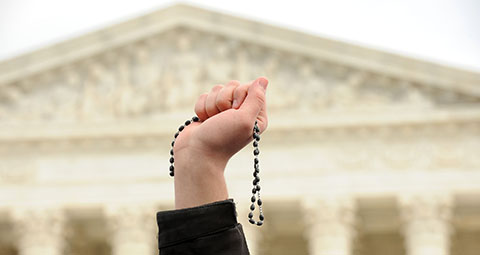February 22 | ![]() 0 COMMENTS
0 COMMENTS ![]() print
print

Our culture is getting more hostile to authentic love, Faith and life
In his Letter from America, Brandon McGinley says we can create a Christian society that counters today's individualistic, profit-obsessed culture
It’s been a hard few months for Catholic public witness in America.
A social media mob, abetted by a credulous mainstream press, churned up a tempest of contempt for Catholic high school boys at the national pro-life march for a regrettable, but complex and ultimately trivial, incident with an indigenous rights activist.
In the ensuing weeks, state-level politicians dabbled in pro-abortion policy and rhetoric radical even by the standards of the United States, which has among the most liberal abortion laws in the world.
One prominent and at least nominally Catholic governor more or less dared his archbishop to excommunicate him. For better or for worse, the prelate declined.
Even as the pressure placed on some Catholic institutions has been alleviated due to an alliance-of-convenience with our strange and venal president, other kinds of power—cultural and economic and political—is being arrayed against the Church seemingly more than ever.
Especially for Catholic parents, it’s hard to foresee what precisely the future might hold, but it’s also hard to imagine that there won’t be more barriers to our children passing on the Faith than there are even for us.
Our culture is getting more hostile to authentic love and Faith and life itself every day.
The question on everyone’s mind is: what do we do about it? Can we turn the tide around? If so, what strategies and tactics are available to us as Catholics?
My thinking about these questions is based on my conviction that the crisis that manifests itself in anti-Catholic rhetoric and the expansion of abortion and other immoral practices goes much deeper than an assault by any one political party or ideology.
Perhaps nowhere is this clearer than in America, where the standard-bearer for the struggle against the political Left is a profane thrice-married adulterer who flirts with white nationalism to gin up his base.
If this is the best ‘we’ can do, then there really isn’t a ‘we’ that Catholics can comfortably belong to.
This isn’t a crisis of ‘us’ versus ‘them’—that is, of winnable electoral and cultural skirmishes—but a crisis of how Western societies have organised themselves for generations.
It’s a crisis of an economic system that values profit above all else, and that views every person who isn’t an owner as an economic input like any other consumable raw material.
It’s a crisis of political systems that ignore and explicitly deny the authority of Christ the King and His Church.
This isn’t speculation: while the vocabulary has shifted, it’s the consistent teaching of every pope of the modern era, from Leo XIII to Francis. So, if the problem is this deep and seemingly intractable, what are we to do?
Well, first of all we mustn’t simply abandon politics. Receding into communities detached from society finds no support in Catholic tradition.
When we can make a difference for the common good without compromising our witness elsewhere, we must attempt to do so.
But the fact is that our situation is closer to that of the early Christians in Rome than that of, say, Catholics in early 20th century Mexico, who fought to maintain a Christian society against atheistic leaders who desired to usurp that society with a secular one.
Our societies are already secularised, even paganised, as the obsession with the demonic ritual of abortion makes clear. There’s no genuinely Christian option on the table. We have to create one.
And how did the early Christians go about that? First, they witnessed to the truth of Christ in their personal conduct.
They sold their possessions and gave to the poor, they treated those on the margins as full and equal human beings, they formed families based on mutual love and respect, and they practised the Faith and refused to deny Christ even in the face of death.
In doing all these things, though, they did something even grander: they created not just a counterculture but a counter-society.
They demonstrated that there was another and better way to live not just as individuals, but as a community and a nation.
That task of generating a counter-society, even more than winning temporary electoral reprieves, should be our priority today.
It might not give us the immediate gratification of tactical victories, but it is a proven long-term strategy to convert a civilisation. And, more importantly, it’s the Christian way.










